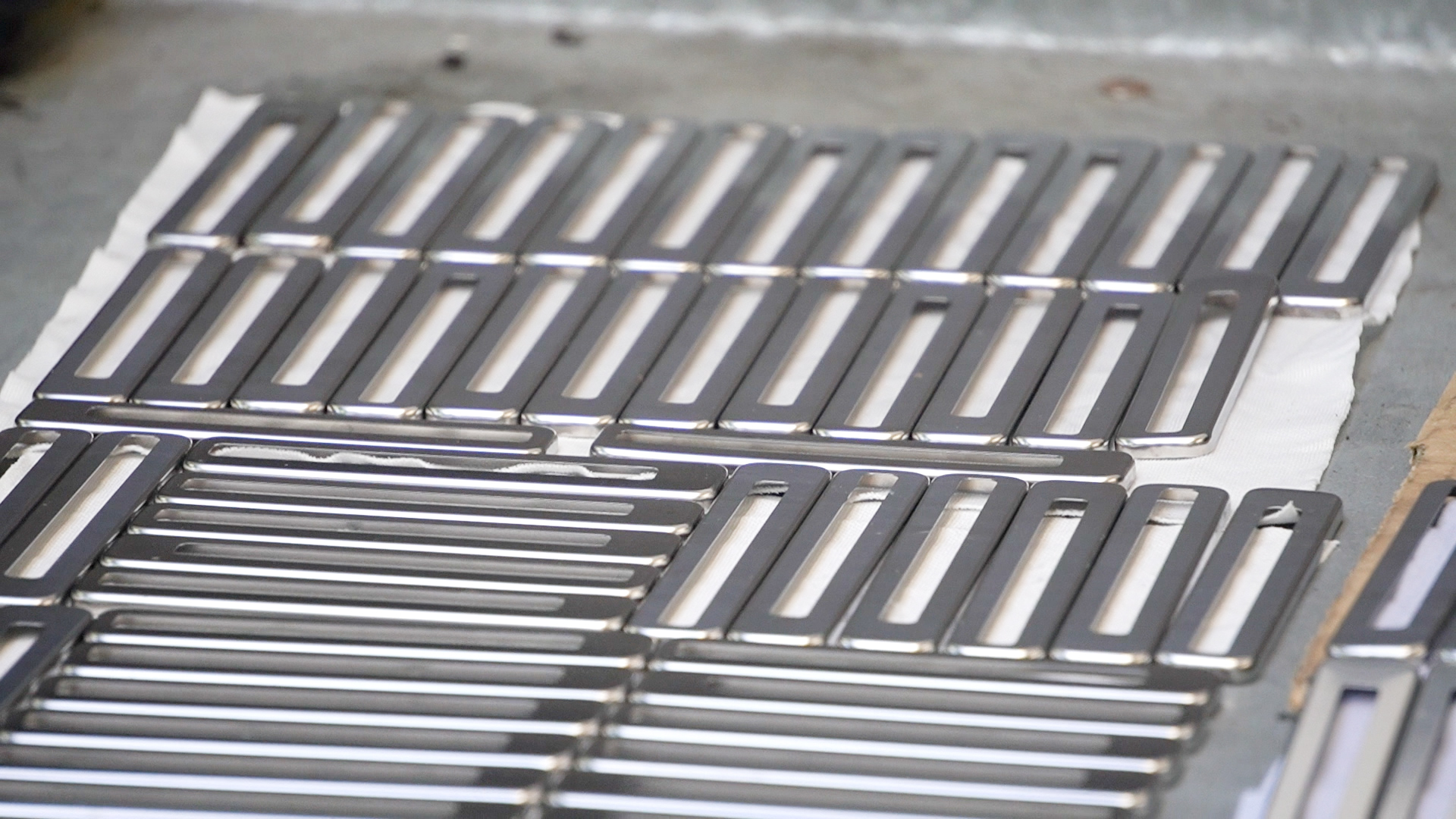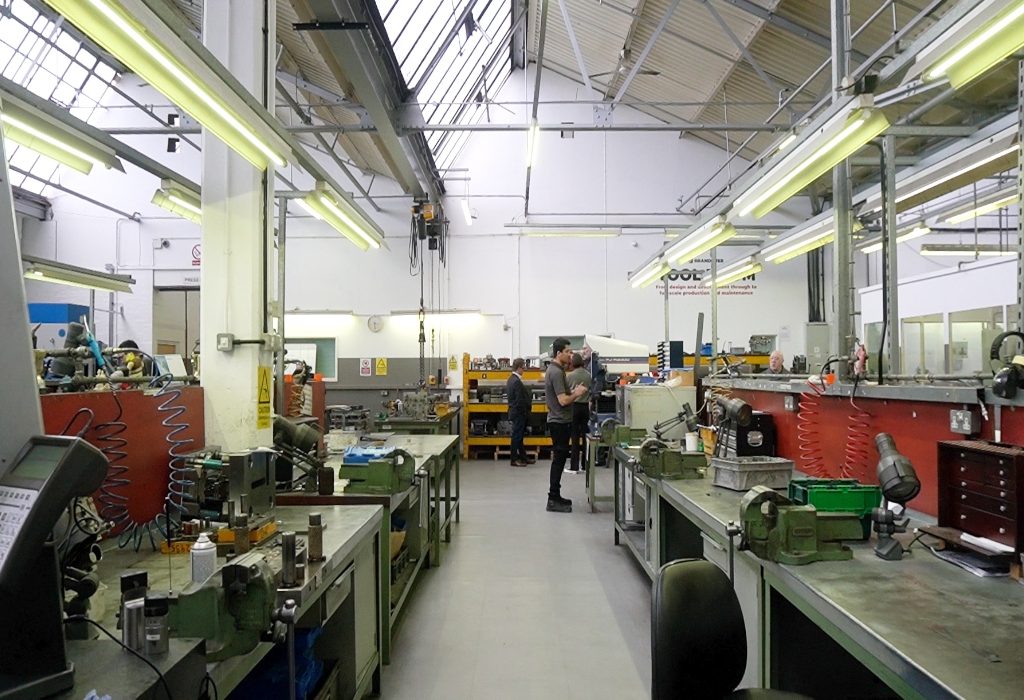Brandauer is an SME manufacturer of high speed progression tooling and contract precision stamped metal components. It’s based in Newtown, just outside Birmingham city centre, but with a global reach. It’s stamping key components for a wide range of industries, including electric motors for the likes of Ford Motor Company. Tom St John chatted with CEO Rowan Crozier about the company’s numerous successes.
Rowan has worked for Brandauer for 15 years, entering the business as Sales and Marketing Director, with a background in engineering. He occupied that role for five years before getting the top job, which he’s held for the last decade. In fact, it was a week of milestones at the time we came for the interview as he was about to turn 50, falling near to the same day as his 15 year anniversary at Brandauer.
Key takeaways
- Companies that diversify products and markets usually reap the rewards
- The alternative of focusing on a core product or market isn’t always a bad thing, but it sometimes leads to stagnation
- Digital transformation projects are not always easy to implement, but the company has helped people adopt new digital skills
- Brandauer saw that its workforce was ageing, and made proactive steps to ensure that average age didn’t increase
- The implementation of the apprenticeship programme has come at cost to the company, but it has pursued this route relentlessly
FAQs
- How has Brandauer evolved its product range from the pen nibs it used to manufacturer in the 1800s?
- What led to the company winning two Kings Awards?
- What systems have been integral to Brandauer’s digital transformation journey?
- Have supply chain concerns dissipated or worsened?
- How is the company able to control its scrap metal to a microgram?
- How long should a company spend planning?
It’s the longest he’s ever worked at one place and he admits, he didn’t set out with this intention. “But I do love it,” he said with a smile. The business was founded in 1862 by two families, the Brandauer’s and the Petit’s, and it has remained in Birmingham for over 160 years. The Petit family actually still own the company to this day. However, it’s family owned rather than family run.
As Rowan pointed out, he’s not family, and nor is anyone that works at the site. The company was originally set up to make pen nibs. These were the days of taking a nib, putting it into a wooden shaft, and dipping into ink to write with. By 1850, Birmingham was producing around 500 million pens a year. The workforce were mainly female, working anywhere between 52-57 hour weeks.
And children from as young as eight or nine were also employed. Thankfully, employment laws have progressed a little since those days. The company was then forced to diversify it’s production during the First World War. It turned to making military provisions such as cartridges. This was the case for most pen manufacturers during this time. Brandauer produced cartridge clips for the British Army’s Lee Enfield rifles.
Brandauer was once again forced into change, as the 1950s saw the invention of the modern pen. Older, Victorian methods of pen manufacturing were becoming outdated. In fact, as early as the 1920s, electrically powered roll-feed presses were installed to automate several stages of the pen making process.

Brandauer has recently broken into the razor blade industry
Brandauer moved into the motor market during this time, producing light pressings for a rapidly expanding industry in the West Midlands. Fast-forward to today, and the company operates in 11 different sectors, exporting to 26 different countries, making all manner of metal components. The slightly sad reality, as Rowan put it, is that it’s unlikely that you will ever see a Brandauer product.
The output of what the company manufactures is metal parts and widgets. “Everything we make is hidden,” said Rowan. “From razors and cars to consumer electronic items such as washing machines and kettles. All of these applications have many of our components in them, and they’re crucial to making them work. But you can’t see them.” To enable the manufacture of huge quantities of these metal parts, Brandauer also makes progression tools. And it’s this tooling that the company believes sets them apart.
Not just in the UK but across Europe, and probably most of the world. In making these tools, Brandauer can supply millions of metal widgets to an array of different industries. This has been key to moving the company forward in new markets. “It’s not usual for a company in Birmingham to be exporting to China,” said Rowan.
“And it’s because of the lack of capability globally. It’s our progression tools that enable that to happen.” Brandauer is now the proud owner of two Kings Awards. Unsurprisingly, one was for international trade. The second was won last year, for innovation. This was awarded for its ability to make those progression tools. The company has also recently won the SME Employer Award at the Enginuity Skills Awards.
A recognition of the journeys that it has been able to put its employees on, according to Rowan. “It’s a bit of a self-fulfilling prophecy. Generally speaking, if you look after people and invest enough into them, you’ll keep them,” said Rowan. He then spoke further about how the company has been built up to this point, touching on some of the challenges and future opportunities that exist.
What are some of the trends that you’re seeing in your industry?
RC: I would say it’s survival of the fittest at the moment. We’re in quite challenging economic times, and it’s the nimble ones among us that are performing the best. Our focus recently has been on innovation, research and development in brand new technologies such as renewables and electrification. We’ve also focused on servitisation, with an emphasis on how best to sell our products and capabilities.
Most manufacturers are starting, or are in the midst of some form of digital transformation project. Tell us about your journey, have there been any challenges in implementing that?
We’ve done numerous digitalisation projects over the past five years or so. The most successful for us was the introduction of a brand new MRP system, which enabled us to really focus in on our costs and the processing of materials that we stamp and supply to our customers. The second example would be our new design system, which is fully integrated for our progression tooling that we make. There have been some particular challenges here around adopting new technology and training existing people in the different ways of operating unfamiliar pieces of equipment. Some smart use of adoption techniques have given us the ability to get over those hurdles and have been key to the success of these projects.
Given that you export and sell into a number of different markets, has the business been impacted by recent supply chain difficulties?
It’s definitely getting better. Nonetheless, we’re processing materials like copper, brass, electrical steels and stainless steel. These are all quite specialist because they’re thin auge. Most of the materials we’re stamping are actually thinner than paper. The lead times associated with these materials are normally long. So, when you’ve got disruption, they can take up to 50 weeks. You’re talking nearly a year from deciding on the material to actually getting it and having it stamped for your customers. Like I say, that sort of disruption has eased a little.
But to guard against this in the future, the solution has been to buy directly from manufacturers – the metal mills. We make sure we maintain really tight communications on a very regular basis. When the customer demand increases or decreases, we can react in the shortest possible time to make sure we don’t run out or we don’t have too much stock.
Many businesses are currently focussed on sustainability and net zero goals. Is that the case for Brandauer?
On a product level, recycling and creating a circular economy is very much embedded in what we do. The scrap metal that we create as a result of our processes is really important. It’s valuable to us and our customers. We’ve always controlled that, and with the investment in a new MRP system, we’ve taken this to the next level. We’re able to control, to a microgram, how much we’re expecting to yield and how much we end up with.
We can then yield the best value for us and our customers when we come to sell and recycle. In addition to that, we’ve put in place new management systems that have made us focus a lot more on our environmental impact. Our journey to net zero probably started about seven or eight years ago when we put that business system in place, and we’ve continued to develop things from there. Now, we’re just dotting the I’s and crossing the T’s on a new net zero strategy that should get us there by 2030.
Birmingham is a real manufacturing heartland. Has that made recruitment easy?
The average age of an employee in the factory 15 years ago was 58. That will only get older if we don’t address it every year we’re trading. We identified this as a significant risk for the business. We invested and engaged heavily to put in place a scheme that was fit for purpose. That doesn’t just mean churning out excellent engineers of the future, it’s about retaining them and keeping them on the journey while we’re training them to be the engineers that we need.

We’ve worked tirelessly at that. We’ve invested around £25,000 per apprentice over a four to six year period – that’s how much it has cost us. We’ve had around 40 through the doors to date. And we’ve retained approximately half. But a good 80% of the other half have actually stayed in the industry. In that respect, we’re doing our bit for the sector, as much as we’re doing it for ourselves. And the numbers speak for themselves. Our average age in the factory now is about 44. I’d say that’s about right for our business and the levels of technicality that we’re involved with.
Do you have any advice for other companies, particularly SME manufacturers?
My mantra is spot the opportunity in everything, even in the darkest of days. Let’s talk about COVID – we actually reinvented our business as a result of the pandemic, and we now offer a much wider capability. We already had the knowledge and expertise to be able to do this. Nothing has changed in terms of how we approach things and the processes we follow. We’ve just pivoted successfully to new markets and customers. We’ve broken into the razor blade industry recently, which is a market we really struggled with previously.
How did we do that? Initially, it was through selling our knowledge, which is built on all the things we’re good at. As a business you must spot the opportunity in everything. One other area I would offer advice is in planning. You really need to spend time on it. It could take you a year to plan, but it will allow you to come up with a roadmap for the next ten years. And work at it over time – don’t take no for an answer when it comes to delivering that goal.
For more articles like this visit our Leadership section








